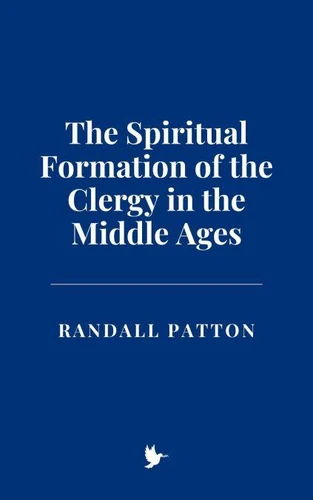The Spiritual Formation of the Clergy in the Middle Ages
Par :Formats :
Disponible dans votre compte client Decitre ou Furet du Nord dès validation de votre commande. Le format ePub est :
- Compatible avec une lecture sur My Vivlio (smartphone, tablette, ordinateur)
- Compatible avec une lecture sur liseuses Vivlio
- Pour les liseuses autres que Vivlio, vous devez utiliser le logiciel Adobe Digital Edition. Non compatible avec la lecture sur les liseuses Kindle, Remarkable et Sony
 , qui est-ce ?
, qui est-ce ?Notre partenaire de plateforme de lecture numérique où vous retrouverez l'ensemble de vos ebooks gratuitement
Pour en savoir plus sur nos ebooks, consultez notre aide en ligne ici
- FormatePub
- ISBN8230285250
- EAN9798230285250
- Date de parution30/01/2025
- Protection num.pas de protection
- Infos supplémentairesepub
- ÉditeurIndependently Published
Résumé
This book delves into the pivotal role of the clergy in the spiritual, intellectual, and socio-political transformation of Christianity from the early medieval period through the Reformation. It examines how the clergy, as the guardians and enforcers of Christian orthodoxy, shaped medieval society and contributed to theological, cultural, and institutional developments. Through a series of detailed chapters, the book explores the evolution of clerical life and function, from the monastic reforms of the 11th century to the rise of Scholasticism and the theological debates that defined the Middle Ages.
The clergy's role in defining doctrines, responding to heresy, and engaging with lay movements is analyzed in-depth, alongside their participation in the educational and social structures of medieval Europe. The work also highlights key moments in Church history, such as the Gregorian Reform, the rise of the mendicant orders, and the theological challenges posed by emerging heretical movements. With a focus on the clergy's influence on the moral and spiritual life of the Christian community, the book traces the tensions between Church authority and the growing desire for reform that would culminate in the Protestant Reformation.
As religious leaders, intellectuals, and political figures, the clergy were both the instruments of preservation and transformation in the medieval Church. The study of their evolution within this context ultimately offers a comprehensive understanding of how clerical identity and function shaped Christian theology and practice, laying the foundation for the religious upheavals of the 16th century and the subsequent changes in Western Christianity.
The clergy's role in defining doctrines, responding to heresy, and engaging with lay movements is analyzed in-depth, alongside their participation in the educational and social structures of medieval Europe. The work also highlights key moments in Church history, such as the Gregorian Reform, the rise of the mendicant orders, and the theological challenges posed by emerging heretical movements. With a focus on the clergy's influence on the moral and spiritual life of the Christian community, the book traces the tensions between Church authority and the growing desire for reform that would culminate in the Protestant Reformation.
As religious leaders, intellectuals, and political figures, the clergy were both the instruments of preservation and transformation in the medieval Church. The study of their evolution within this context ultimately offers a comprehensive understanding of how clerical identity and function shaped Christian theology and practice, laying the foundation for the religious upheavals of the 16th century and the subsequent changes in Western Christianity.
This book delves into the pivotal role of the clergy in the spiritual, intellectual, and socio-political transformation of Christianity from the early medieval period through the Reformation. It examines how the clergy, as the guardians and enforcers of Christian orthodoxy, shaped medieval society and contributed to theological, cultural, and institutional developments. Through a series of detailed chapters, the book explores the evolution of clerical life and function, from the monastic reforms of the 11th century to the rise of Scholasticism and the theological debates that defined the Middle Ages.
The clergy's role in defining doctrines, responding to heresy, and engaging with lay movements is analyzed in-depth, alongside their participation in the educational and social structures of medieval Europe. The work also highlights key moments in Church history, such as the Gregorian Reform, the rise of the mendicant orders, and the theological challenges posed by emerging heretical movements. With a focus on the clergy's influence on the moral and spiritual life of the Christian community, the book traces the tensions between Church authority and the growing desire for reform that would culminate in the Protestant Reformation.
As religious leaders, intellectuals, and political figures, the clergy were both the instruments of preservation and transformation in the medieval Church. The study of their evolution within this context ultimately offers a comprehensive understanding of how clerical identity and function shaped Christian theology and practice, laying the foundation for the religious upheavals of the 16th century and the subsequent changes in Western Christianity.
The clergy's role in defining doctrines, responding to heresy, and engaging with lay movements is analyzed in-depth, alongside their participation in the educational and social structures of medieval Europe. The work also highlights key moments in Church history, such as the Gregorian Reform, the rise of the mendicant orders, and the theological challenges posed by emerging heretical movements. With a focus on the clergy's influence on the moral and spiritual life of the Christian community, the book traces the tensions between Church authority and the growing desire for reform that would culminate in the Protestant Reformation.
As religious leaders, intellectuals, and political figures, the clergy were both the instruments of preservation and transformation in the medieval Church. The study of their evolution within this context ultimately offers a comprehensive understanding of how clerical identity and function shaped Christian theology and practice, laying the foundation for the religious upheavals of the 16th century and the subsequent changes in Western Christianity.
















